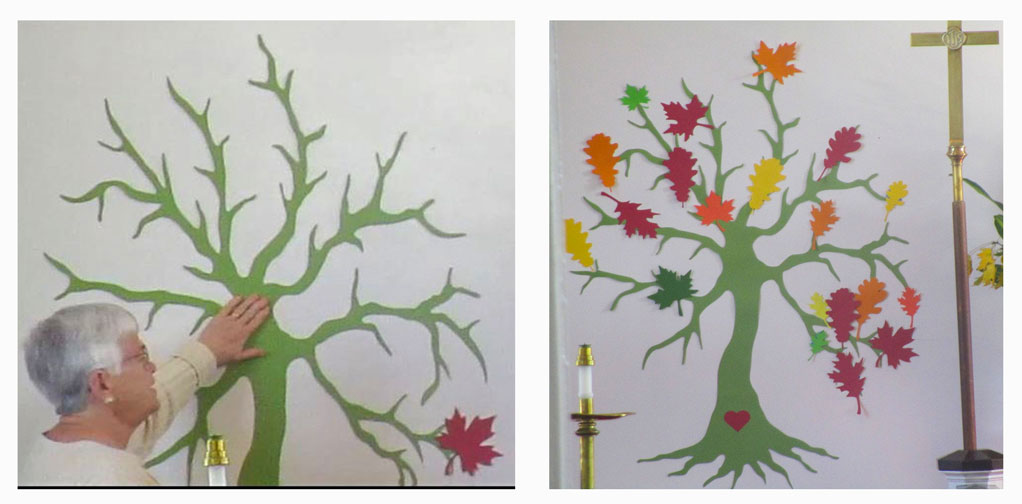
2023 Sun Oct 29
Reformation Day, Oct. 31, 2023

Reformation Day is a religious holiday celebrated on October 31, alongside All Hallows’ Eve, in remembrance of the Reformation, particularly by Lutheran and some Reformed church communities. It is a civic holiday in some German states.
It celebrates Martin Luther’s posting of the 95 theses on the church door at Wittenberg in Germany on Oct. 31, 1517. The event is seen as sparking the Protestant Reformation.
There are some questions of fact. The event was not publicized until 1546 by Philipp Melanchthon and no contemporaneous evidence exists for Luther’s posting of the theses. At the time, it was common for scholars to post their debate points on the door where people could read them. Copies of Luther’s theses and his fiery follow-up sermons were mass produced on a relatively new invention the printing press.
Luther’s movement began as a criticism of Catholic practices, not to split off from the Catholic church. Sinners could buy God’s forgiveness by purchasing an indulgence. Luther preferred justification by faith. He also wanted people to read the Bible in their own languages and not just in Latin
The Reformation led to the split from one Catholic church to Protestant ones. There are now nearly 45,000 Protestant denominations around the world, including mainline Protestants, Anglicans, Evangelicals, Pentecostals and more.
It has been seen as the most significant event in Western Christian history and mirror in which we measure ourselves today. Many of the differences that promoted the reformation have been solved – indulgences, justification by faith and having the Bible printed in multiple languages. Others such marriage of priests, same sex marriages are still divisive. Will they be able celebrate communion together ? That may take another reformation.
Here is an impromptu performance after the 11am service on Oct. 27, 2019 of part of Luther’s famous hymn. He wrote the words and composed the melody sometime between 1527 and 1529:
ECM Community Thanksgiving donation
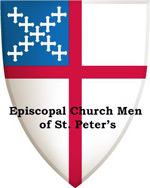
From Ken Pogue. “Each year the Episcopal Church Men help St Peter’s provide support to those in need during the holidays. The men coordinate with the Caroline County Department of Social Services to provide families in the area with gift cards
“Your donations are greatly appreciated by the ECM and the recipients of the gifts in the Port Royal community, Thank you so very much in advance from a grateful community.”
If you’d like to donate for the Thanksgiving offering, please make a check to St Peter’s with ECM in the memo line by Sunday, Nov. 5
Last year $500 was given at Thanksgiving and $750 Christmas.
Bulletin, Pentecost 22, Oct. 29, 2023
Click here to view in a new window.
Sermon, 22nd Sunday after Pentecost, Oct. 29, 2023
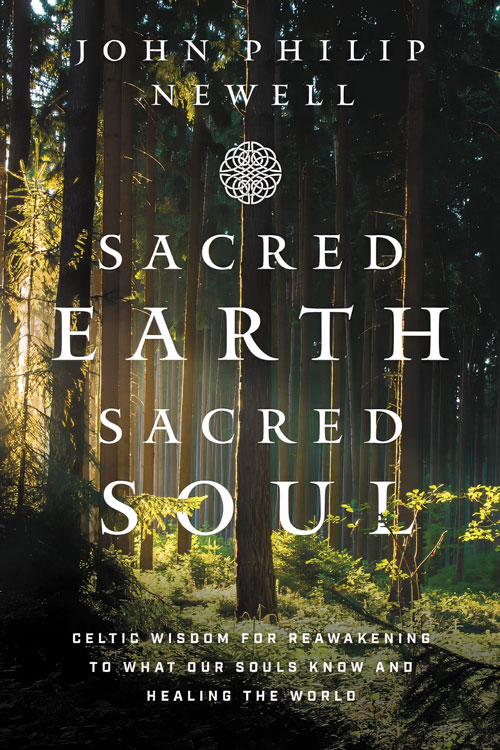
Today’s passages are about love: loving God, loving our neighbors, and loving creation as well. When we love all that God has made, we discover for the first time, or all over again, even more brightly, that God’s glory shines through all of creation. When we enter that sacred glory, we can’t help but open our hearts to God’s deep, healing love for each one of us and for all that God has made.
As we enter God’s shining, whether it’s walking through the woods on a bright autumn afternoon, the air shimmering golden, or seeing a glimmer of silver light reflected in drops of falling rain, we begin to sense that God’s glory dwells not only in the beauty of creation, but in our hearts as well. We begin to sense that we, ourselves, our souls, our bodies, are all caught up in this glory, that we are part of God, part of the earth and part of one another.
This same shining glory that we find in creation is the shining glory that we see in one another when we remember that God made us all, loves us all, that all of us are beloved by God.
Opening our hearts to God’s glory and being willing to enter it is the path to holiness.
“You shall be holy, for I the Lord God am holy,” God says to the Israelites.
God intends for each one of us to claim our holiness by coming to know that all that God made is holy and blessed, that all creation holds the shining glory that is God.
And then God asks us to gratefully respond to this shining glory with compassion, mercy and justice, for the compassion that we have for one another is a holy act that allows God’s shining to break through, even in the places where God seems to be absent.
Lectionary Pentecost 22, Proper 25, Oct. 29, 2023
I.Theme – Love as the greatest of God’s commandments.
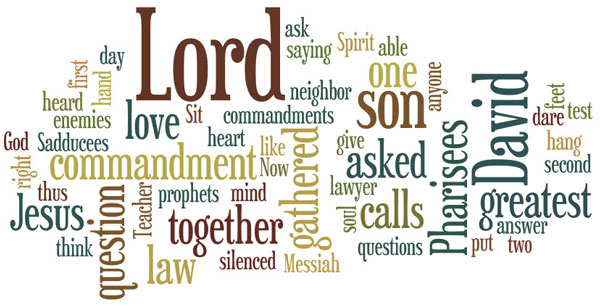
"The Greatest Commandment " – From Wortle
The lectionary readings are here or individually:
Old Testament – Leviticus 19:1-2,15-18
Psalm – Psalm 1 Page 585, BCP
Epistle –1 Thessalonians 2:1-8
Gospel – Matthew 22:34-46
These passages this week echo the challenge of the Christian journey. We have moments when we see God’s reign breaking through in this world–moments of justice, of hope, of peace–and other times, it seems like war, poverty and famine will continue forever. But we do not lose hope, and we know that our part counts in the reign of God. And our part is to create equitable relationships with those around us. We can’t expect to save the world but we can seek to maintain relationships with those around us.
Leviticus provides a taste of the holiness codes of Israel, on how to live in community with one another. Leviticus is one of the most difficult books to read in the Bible, mainly for the listing of codes and laws that do not necessarily make sense in today’s society, and we are missing the context, both historically and culturally for understanding the application of them. However, the theme of how to live together in community is a theme that transcends some of the cultural and historical context–when decisions or judgments have to be made in the context of community, you can’t show partiality, but you have to be just. In connection with the Gospel the statements on our neighbors concern us – avoiding hatred, vengeance, grudges and basically love your neighbor
In 1 Thessalonians 2:1-8, Paul shares about his journey to Thessalonica, not physically, but rather how he has come to be there on his journey of faith–coming not to judge or to trick them or to test them, nor to please them or flatter them, but simply coming as they are, people who follow God. Echoing back to the passage in Leviticus, Paul is coming as a person of the community of faith–treating the Thessalonians as such, and expecting the same treatment in return. Paul tells them “so deeply do we care for you that we are determined to share with you not only the gospel of God but also our very selves” (vs 8). To Paul, telling about God is one thing–living it out is what we are called to do, by sharing ourselves fully with the members of the faith community–being our honest and true selves, without trickery or deceit, without slander or gossip or hate in our hearts–but to be genuine people that follow Christ.
Psalm I extols the blessedness of one who avoids the path of the wicked and walks in the way of wisdom and life. The psalm is built around two contrasting images, that of a tree planted by streams of water and that of chaff in the process of winnowing the grain. The former is an image of the righteous, the latter of the wicked. The former person is ‘happy’ or ‘blessed’, the latter is perishing.
The tree prospers by fulfilling its purpose of bearing fruit in its season. God has ordained that this is a process which takes time, indeed, a different time for each individual. We prosper by growing in grace, coming to maturity, and bearing fruit. Material prosperity is not the principle focus of this text.
The law was not only the source of specific rules and regulations, but it was also intended to teach the Israelites principles which would govern their actions. The fundamental issue underlying the Sermon on the Mount was over the interpretation of the Old Testament law
Matthew’s passage is on the Greatest Commandment. Jesus has been leading up to this pinnacle teaching in his parables and teachings about the kingdom or reign of God. This passage represents the third of three attempts to entrap Jesus, after he has entered Jerusalem in triumph, riding on a donkey, with a large crowd spreading cloaks and branches on the road as they shouted, “Hosanna to the Son of David.”
After the Pharisees and the Sadducees have questioned him, a lawyer asks him which is the greatest commandment. On the face of it, the question appears very honest. The Pharisees identified 613 commandments in the Torah (the first five books of the Bible). Two hundred forty-eight were positive (“thou shalt”) and three hundred sixty-five were negative (“thou shalt not”). How could anyone remember all of them? Were some more important than others?
And Jesus sums up the commandments in the recitation of the Shema, “You shall love the Lord your God with all your heart, and with all your soul, and with all your mind,” and with the call “You shall love your neighbor as yourself.” He was the first to place both of these side by side.
Both of these commandments sum up the Ten Commandments, for the first four are about relationship with God and the last six are about relationship with each other in the community. But Jesus goes further in saying, “On these two commandments hang all the law and the prophets.” In Jesus’ day, the Bible that the Jews knew had the Torah, the Law, the first five books–and it contained the books of the prophets (the Psalms and other writings were still being compiled). Basically, Jesus is saying that this is the point of the whole Bible. Everything else hangs on it. All other laws, codes, rules, ordinances and such fall under these two commandments. This is the point of the whole thing.
After answering this question, however, Jesus poses a question to the Pharisees about whose son the Messiah is. Jesus is trying to emphasize that the Messiah is the son of God, not just of David–in other words, the Messiah, while prophesied about in Hebrew scripture and understood in Jewish culture, is a Messiah for the world, not just for the people. Jesus is not just the son of David as a descendant of David, but Jesus is the Son of God, and therefore a Messiah for all people. And therefore Jesus’ teachings about loving others and loving God are beyond the community present but are teachings to be lived out by all who follow Jesus. They are beyond the law and culture of one people, but for the whole world.
Visual Lectionary Vanderbilt Pentecost 22, Oct. 29, 2023
Click here to view in a new window.
Sunday Links, Oct. 29, 2023
The focus this Sunday continues to be the stewardship campaign, All Saints and collection for the ECM Thanksgiving. ”
Lectionary link for Oct. 29, 22st Sunday after Pentecost
Lector: Andrea Pogue
Altar Cleanup: Jan Saylor
Looking ahead…
Recent Articles, Oct. 29, 2023
Bulletin
Sermon
Lectionary for Pentecost 22
Photos Oct. 29, 2023
Videos, Oct. 29, 2023
Commentary Oct. 29
Vanderbilt visual commentary
The Flow of the lectionary
Stewardship Commentary
Gospel Reflection
Concept of love in Biblical times
Introduction to Thessalonica
Why does Paul go to Thessalonica”
Request for names for All Saints Sunday
Ministries
The Village Harvest, Oct. 2023, the end of 9 years
ECM Thanksgiving donations
Completion of God’s Garden class
End of October
Reformation Day Oct. 31, 2023
How do we get halloween (Oct. 31) from All Saints (Nov. 1) and All Souls(Nov.2)?
Stewardship 2024
To be a Church Rooted in Love
Planning your financial giving
Options for estimating your giving
Ministry Connections
About Stewardship
5 Principles of Stewardship
Stewardship is…
Stewardship FAQ
2024 Planning
Walk in Love planning help
Fall photos
Robert Frost, October
Early Fall
The flow of the Lectionary, Oct. 29, 2023

From the “SALT Project”
1) This is the fifth week focusing on the back-and-forth in the Jerusalem Temple between Jesus and various religious and civic authorities, all of which takes place over a two-day sit-in or “teach-in” in the Temple by Jesus, his entourage, and the accompanying Palm Sunday crowds. This week, the final round: a last question from a group of religious leaders, and a last question from Jesus.
2) The duels so far have consisted largely of the authorities trying to discredit Jesus by testing his knowledge and trying to entrap him — and so it’s a fitting reversal that he finishes out the struggle by stumping them with a scriptural riddle.
3) It was a common exercise among religious scholars of the day to debate which of the 613 commandments in the law is “the greatest,” meaning the one that sums up the essence of the whole, or serves as the hub at the center of them all. The so-called “Shema” (or “Listen”) figured largely in Israelite liturgy and life: “You shall love the LORD your God with all your heart, and with all your soul, and with all your might” (Deut 6:5). “Love your neighbor as yourself” is from Leviticus 19:18, a relatively minor commandment among the 613, but at the same time one sometimes exalted as quintessential
4) The context of Leviticus 19 is worth bearing in mind, since it indicates what sort of “love” Jesus is referencing. The verses just prior to 19:18 command Israel to leave gleanings in the fields both for the impoverished and for immigrants, and to refrain from dishonesty, stealing, mistreating the disabled, corruption, slander, hatred — and finally, in verse 18 itself, vengeance: “You shall not take vengeance or bear a grudge against any of your people, but you shall love your neighbor as yourself: I am the LORD” (Lev 19:18).
5) Likewise, the context of Deuteronomy 6:5 is worth remembering: here the “love” God commands is to be manifest in “keeping all God’s decrees and commandments, so that your days may be long” (Deut 6:2). That is, the law is given not as an arbitrary list of “thou shalts and shalt nots,” but rather as a listener’s guide to vibrant, healthy communal life.
“Tens” Stewardship Commentary, Oct. 29, 2023
Click here to view in a new window.
The Village Harvest, Oct. 2023, the end of 9 years
The Village Harvest began with its first distribution in Nov. 2014. Thus in Oct. 2023, we are measuring 12 months since November, 2022 and the end of 9 years. In Nov. 2023, we will begin the 10th year of the harvest.
For the 12-month period ending Oct. 2023, we served 1012 customers. That is the lowest since Nov 2019 to Oct. 2020 due to the pandemic. We have been on a declining trend since 2016. However, 2023’s decline is related to the lower 1st quarter 2023 clients. For the first quarter, We served only 218 clients in 2023 much lower than in earlier years (2020, 310;2021, 295; 2022, 296)

Reviewing the period after the first quarter (April through Oct) provides a much different result. We served 623 in 2023 (April through Oct). This result exceeded 584 (2022) and 506 (2021) The first quarter of this year was clearly an anomaly that affected the 12-month results and the Harvest’s figures since the first quarter are impressive. The April-Oct figures currently are below that of earlier years which were a minimum of 800

Concept of Love in Biblical Times
By John Pilch
The Greek language (the language of the New Testament) uses two different words to describe and define love. The most commonly used Greek word translated "love" in the New Testament is "agape." This love is represented by God’s love for us. It is a non-partial, sacrificial love.
In contrast, our love is usually conditional and based upon how other people behave toward us. This kind of love is based upon familiarity and direct interaction. The Greek word "phileo" defines this kind of love, often translated "brotherly love." Phileo is a soulish (connected through our emotions) kind of love – something that can be experienced by both believers and non-believers. This is in contrast to agape, which is love extended through the spirit. Agape love requires a relationship with God through Jesus Christ, since the non-regenerated soul is unable to love unconditionally. Agape love gives and sacrifices expecting nothing back in return.
"What does Jesus understand by love? Mediterranean cultural anthropology sheds some light. Remember that our ancestors in the faith were strongly group centered. The group was family, village, neighborhood, and factions (like the Twelve, the Pharisees, etc.) which a person might join.
“God’s Garden” Fall Session Completed
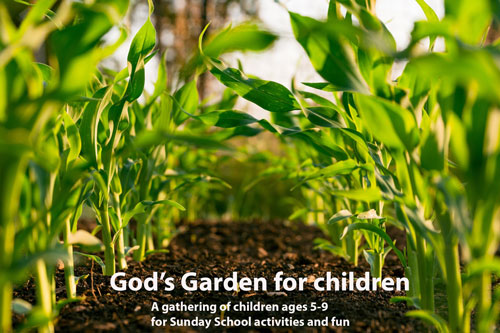
This fall, Jan Saylor and Elizabeth Heimbach have been meeting each Sunday with a wonderful group of children who have been enthusiastic about singing, talking, listening, and learning.
God’s Garden met for the first time on Sept 17 for 30 minutes in the Parish House before church for 5-9 year olds. The curriculum was developed by the Episcopal Relief and Development organization, and it is designed to help children see God’s gifts around them everywhere in the world of nature.
The class combines song “The Lord’s Been Good to Me”, Bible stories, and crafts. The first lesson focused on water; other lessons centered on animals, seeds, and soil. A favorite part of the animal lesson involved packing little bags of treats for cats and dogs. The class was delighted to distribute the treats to pet lovers as part of the service celebrating St. Francis.
Attendance has been mosty comprised of 3 girls who are very engaged answering questions and responding. The class completed after Sunday’s lesson Oct. 22, 2023. Looking forward, Jan and Elizabeth hope to continue with a second session later in the year.
Introduction to Thessalonians

Editor’s note – Passages from 1 Thessalonians will be the Epistle reading until Nov. 16. Here is a short introduction –
Thessalonica was a bustling seaport city at the head of the Thermaic Gulf. It was an important communication and trade center, located at the junction of the great Egnatian Way and the road leading north to the Danube.
It was the largest city in Macedonia and was also the capital of its province. Thessalonica was the largest city of Macedonia. It has been estimated that during Paul’s time its population may have been as high as 200,000. The majority of the inhabitants were Greeks, but there was also a mixture of other ethnic groups, including Jews
In c. 315 BCE Cassander, the son-in-law of Philip of Macedon (who fathered Alexander the Great) gathered and organized the area villages into a new metropolis, Thessalonica. He gave the city its name in honor of his wife, the half-sister of Alexander.
Thessalonica remained in Greek hands until 168 BCE, when the Romans took possession after winning the battle of Pydna
The Roman proconsul, the governor of Macedonia, had his residence in Thessalonica, but because it was a “free city” he did not control its internal affairs. No Roman garrison was stationed there, and in spirit and atmosphere it was a Greek rather than a Roman city. Enjoying local autonomy, the city was apparently governed by a board of magistrates
It is most likely that 1 Thessalonians was written shortly after Paul’s arrival in Corinth, for he would be eager to correspond with the new church as soon as possible. This would be spring of 50 CE. It may have been 51 CE based on an inscription discovered at Delphi, Greece. Thus, 1 Thessalonians is the second canonical book penned by the apostle Paul, written within two years after Galatians.
The background of the Thessalonian church is found in Ac 17:1–9. Since Paul began his ministry there in the Jewish synagogue, it is reasonable to assume that the new church included some Jews. However, 1:9–10; Ac 17:4 seem to indicate that the church was largely Gentile in membership.
Why Paul goes to Thessalonica ?

Paul’s purpose in writing this letter was to encourage the new converts in their trials (3:3–5), to give instruction concerning godly living (4:1–12) and to give assurance concerning the future of believers who die before Christ returns (4:13–18)
On his Second Missionary Journey, Paul had travelled through Asia Minor. Paul wasn’t a "solo missionary," rather he operated with a small team — in this case it consisted of Paul, Silas, and Timothy.[4]
At Troas, Paul has a vision of a Man of Macedonia asking him to come and help them. He takes it as God’s call, travelling to Macedonia and later to Greece (Achaia).
In Philippi he begins a church, but Paul and Silas end up being beaten and thrown in jail. They are released by m e ans of an e arthquake, convert their jailer and his family, but are still asked to leave by the city officials in the morning.
Undeterred, Paul and his band continue south to Thessalonica.
"1 When they had passed through[5] Amphipolis and Apollonia, they came to Thessalonica, where there was a Jewish synagogue. 2 As his custom[6] was, Paul went into the synagogue, and on three Sabbath days he reasoned with[7] them from the Scriptures, 3 explaining[8] and proving[9] that the Christ had to suffer and rise from the dead. ‘This Jesus I am proclaiming to you is the Christ,’ he said. 4 Some of the Jews were persuaded and joined Paul and Silas, as did a large number of God-fearing Greeks and not a few prominent women." (Acts 17:1-4)
Some of the converts are women of high rank, wives of city officials. However, most of the converts seem to have been Gentiles from the working class, and many of these are saved not from the synagogue, but directly from paganism (1:9). The Jews in Thessalonica are upset that Paul is attracting such a large following and seek to stop him.
"5 But the Jews were jealous; so they rounded up some bad characters from the marketplace,[10] formed a mob[11] and started a riot[12] in the city. They rushed[13] to Jason’s house in search of Paul and Silas in order to bring them out to the crowd. 6 But when they did not find them, they dragged[14] Jason and some other brothers before the city officials, shouting: ‘These men who have caused trouble[15] all over the world have now come here, 7 and Jason has welcomed them into his house. They are all defying Caesar’s decrees, saying that there is another king, one called Jesus.’" (Acts 17:5-7)
Notice that the Jews don’t attack Paul directly. They find "some bad characters from the marketplace" to do their dirty work for them. In this period, a militant messianic movement (different from Christianity) was spreading among Jewish communities. To stop the violence, in 49 AD Emperor Claudius expelled the Jews from Rome — which is why Aquila and Priscilla had recently moved from Rome to Corinth (Acts 18:2).
So when the mob accuses Paul and Silas of having "caused trouble all over the world" and "defying Caesar’s decrees" with regard to a messiah figure, they are connecting Paul and Silas to the recent civil unrest among the Jews in Rome. That’s why the Jews couldn’t bring these charges themselves.[16]
"8 When they heard this, the crowd and the city officials were thrown into turmoil.[17]
9 Then they made Jason and the others post bond and let them go. 10 As soon as it was night, the brothers sent Paul and Silas away to Berea." (Acts 17:8-10a)
Jason is a prominent Jew who has converted to Christ, since elsewhere Paul seems to refer to him as a kinsman (Romans 16:21). The Greek name "Jason" was common among the Hellenistic Jews, who used it for "Jesus" or "Joshua."[18] Jason is apparently forced to put up money and pledge to the city officials that Paul and his band would leave the city and not cause further problems.
But the Thessalonian Jews don’t stop there. They disrupt Paul’s ministry in the next city, too.
"When the Jews in Thessalonica learned that Paul was preaching the word of God at Berea, they went there too, agitating[19] the crowds and stirring them up. The brothers immediately sent Paul to the coast, but Silas and Timothy stayed at Berea." (Acts 17:13-14)
Paul travels to Athens and stays there for a time. Later he goes to the Greek city of Corinth, where he apparently writes the Thessalonian letters
